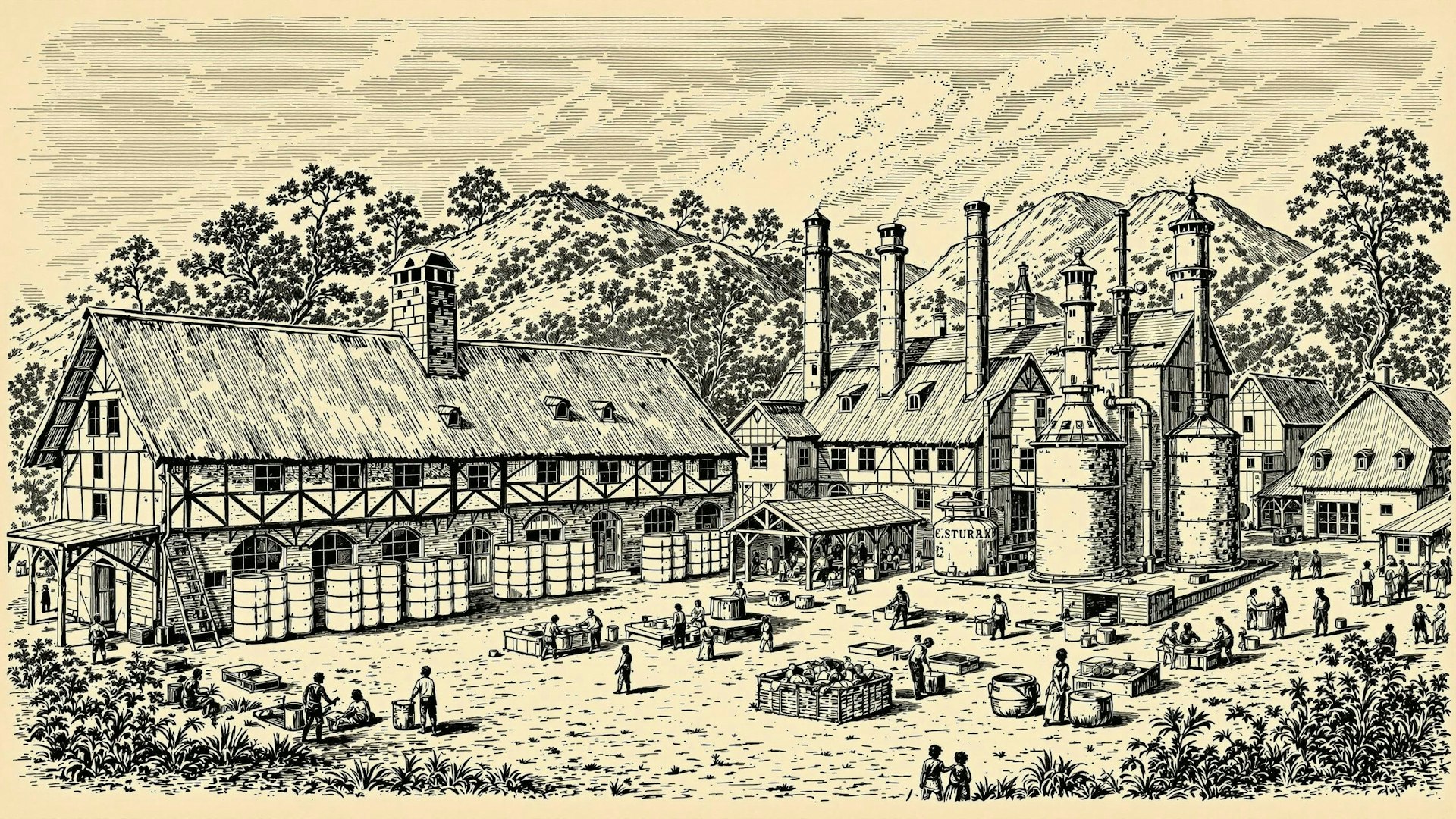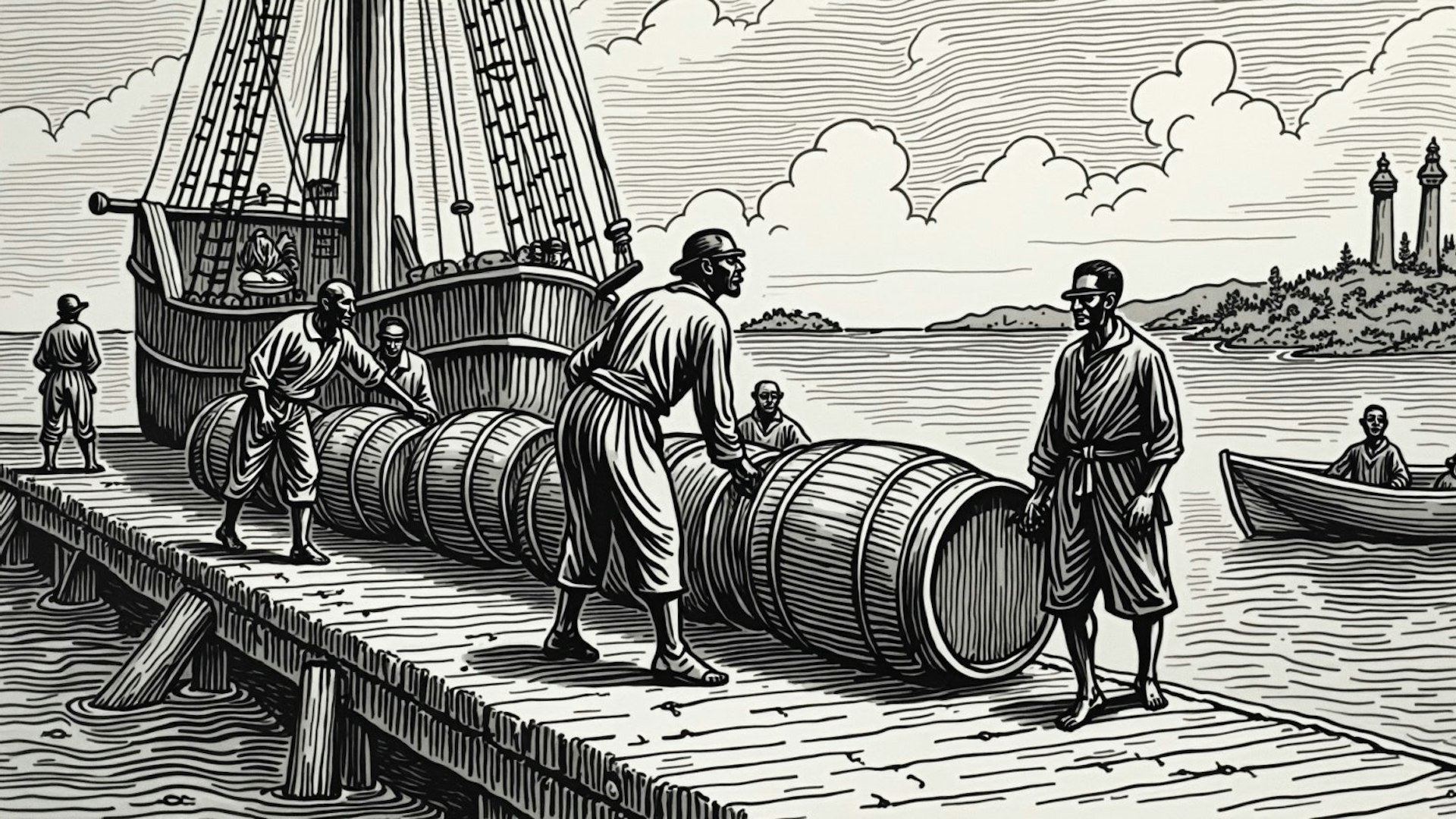
Sugar at War: The Birth of a Colonial Empire
The invention of rum is intrinsically linked to the history of sugar production in the Caribbean. In the 17th century, European colonial powers—particularly France, Spain, England, and the Netherlands—competed for control of tropical islands where sugarcane plantations were multiplying. The demand for sugar was booming in Europe, where it was considered a luxury product.
Molasses: A Disdained Liquid Treasure
However, intensive sugarcane cultivation produced an abundant and cumbersome byproduct: molasses. This black, syrupy residue, derived from the extraction of crystallized sugar, was initially seen as waste. It was produced in massive quantities (3 kg of molasses for every 4 kg of sugar) and had no immediate use. Due to its low economic value, molasses wasn’t worth exporting by ship—it took up too much space, and Europeans had no interest in it. By the 1680s, reports show that the French were dumping more than 1.5 million liters of molasses into the ocean annually. In tropical climates, where heat accelerated decomposition, its accumulation attracted insects and caused nuisances.
Tropical Alchemy: The Discovery of Rum
It was in this context that experiments were conducted to find a way to make use of this byproduct. Who was the genius who thought to ferment and distill molasses into alcohol? Various hypotheses exist (to be explored in a future blog!), but it is certain that this discovery marked a turning point in the history of alcohol production in the Caribbean.

Rum: The Colonies’ Brown Gold
Rum production solved two major problems: it eliminated a burdensome waste product while creating a marketable good. Rum quickly became an important commodity in colonial trade. It was consumed locally by settlers and sailors but was also exported to Europe and North America. Plantation owners invested heavily in distilleries equipped with cutting-edge technology from Europe. Rum sales alone generated enough income to cover all plantation expenses, with sugar sales representing 100% profit!
A Tool of Economic Freedom
Rum played a key role in the economic emancipation of settlers from their European metropoles. In the Caribbean, where sugar production was dominated by European merchants and investors, rum provided local plantation owners with a more direct source of income. Its production and trade were less regulated, allowing settlers to bypass monopolies imposed by the metropoles. Rum quickly became an essential currency in the islands, facilitating bartering with other colonies and expanding local trade networks.
The Intoxication of Independence
Moreover, the growing consumption of rum in North American colonies strengthened economic ties between the Americas while reducing the colonies' dependence on European goods. Some historians even argue that rum played a symbolic role in independence movements, embodying the ingenuity and resilience of settlers against the colonial order imposed by the metropoles.
A Caribbean Emblem
Of course, the success of rum is closely tied to the slavery system that governed its production in the Caribbean. This is undoubtedly the most horrific chapter in this history, and rum is inextricably linked to it. However, over time, rum evolved to become an emblematic product of the Caribbean, representing a strong cultural identity claimed by its inhabitants despite the horrors of slavery that enabled its creation. Today, it is reclaimed and celebrated worldwide as a symbol of the ingenuity and resilience of Caribbean peoples. More broadly, rum embodies the spirit of the New World: a product born from colonial lands that managed to assert itself against European goods by developing its own identity. Every drop of rum testifies to the creativity and determination of settlers who had to invent new ways to thrive in a system dominated by European rules.
A Liquid Rebellion
Thus, rum has become much more than just an alcoholic beverage. It represents emancipation and the ability of people to transform a marginal product into a symbol of resilience and independence. In the collective imagination, it embodies rebellion against monopolies and colonial restrictions while upholding the values of autonomy and freedom that define the history of the New World. Rum of the Americas, rum of freedom!
And What About Quebec?
To be continued in a future blog by FOVE Académie!
Blog inspired by:
Curtis, W. (2018). And a bottle of rum: A history of the New World in ten cocktails (Revised and updated ed.). Broadway Books.

